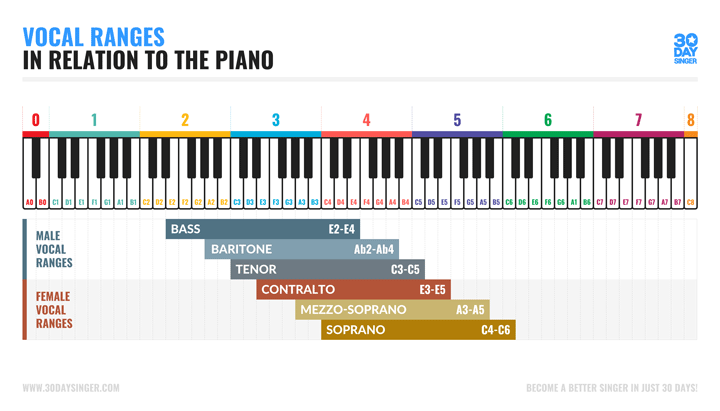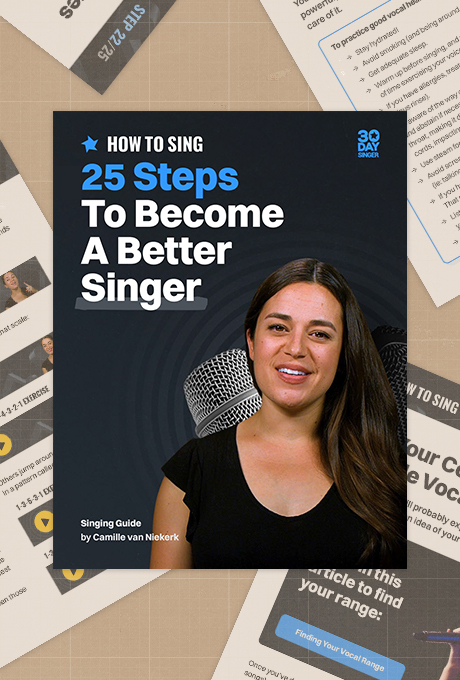The Best Vocal Coach
May 21, 2024By Mitch Wilson
So, you want to learn how to sing?
Whether you’re dreaming of belting out powerful ballads, serenading with soft melodies, or just improving your shower concert performances, the right vocal coach is key.
With the rise of online voice lessons, anyone can learn to sing from the comfort of their home.
You might not think you need a singing coach since online singing programs are so well built, organized and in-depth.
But a singing coach (or vocal coach, it's interchangeable) is key to ensure you are singing the right way and the best way.
The personal guidance of an online singing coach will speed up your learning and you'll be able to improve much more quickly.
Here is a list of the best singing techniques a vocal coach should be teaching you.
The Basics
Setting Your Goals
Before diving into the technicalities, it’s essential to set your goals.
Are you looking to join a band, perform at open mics, or just impress friends at karaoke?
Knowing what you want to achieve will help tailor the learning path your vocal coach sets for you.
Understanding Vocal Ranges
One of the first things you'll encounter is the vocal ranges chart.
This handy tool helps you understand where your natural voice sits and what notes you can comfortably hit.
Use a piano and follow the chart to determine your highest and lowest singable notes.
Note - these notes need to be able to be sung comfortably.
Once you identify the highest and lowest notes you can comfortably sing, you'll have your vocal range!
This knowledge is crucial as it sets the stage for the exercises and songs your online vocal coach will be able to show you.
Later on you can work on extending this range to sing even higher and lower.

Warm-Ups: Essential for Every Singer
Just like athletes need to warm up their muscles, singers need to do the same with vocal warm ups.
Great warm-up exercises might include lip trills, humming, and simple scales.
These exercises prepare your vocal cords for more strenuous work and help prevent strain or injury.
Building Technique
Breath Control
One of the foundations of singing is proper breath control.
Vocal coaches often start with exercises to strengthen your diaphragm and improve breath support.
You’ll learn techniques like diaphragmatic breathing, which allows you to maintain a steady flow of air and support your voice through longer phrases.
Pitch and Tone
Learning how to sing in tune is a major milestone.
Exercises to dial this in might include matching pitches, singing scales, and using a piano or even a tuning app.
Developing a good ear for pitch is essential for any singer.
Don't worry, even to sing at a high level you won't need perfect pitch.
Vocal Health
Understanding how to take care of your voice is crucial.
Vocal health tips such as staying hydrated, avoiding straining your voice, and knowing when to rest are very important.
Your vocal coach will also show you about the importance of proper posture and relaxation techniques.
This is key because singing is such a physical activity; it takes the whole body!
If you don't use proper technique, you might be left wondering how to get your voice back.
A singing teacher online like one from 30 Day Singer is greatly equipped to show you everything you need to know about these skills.
Advanced Techniques
Developing Your Range
Once you’ve mastered the basics, it's time to expand your range.
Your vocal coach will show you exercises to extend both your lower and upper limits in a gradual and healthy way.
This is where a singing ranges chart comes in handy again, as you can track your progress and set new targets.
Dynamics and Expression
Singing isn’t only about hitting the right notes.
It's about conveying emotion and connecting with your audience.
You’ll learn how to use dynamics (varying your volume) and expression to bring your songs to life.
Try practicing soft singing (piano) and loud singing (forte), as well as exploring different vocal textures.
Style and Genre
Every genre has its unique vocal style and technique.
Whether you’re into pop, rock, jazz, or classical, your singing course should cover the specific skills required for your preferred style.
This might include learning how to sing belting songs, use vibrato, or incorporate vocal runs and riffs.
Performance Skills
If your goal is to perform live, developing stage presence is key.
This includes learning how to project confidence, engage with your audience, and handle nerves.
Maintaining eye contact, using body language effectively and conveying the right emotions is key to having a stellar performance.
For those looking to perform with amplification, understanding microphone technique is essential.
This includes knowing how to hold the mic, control your distance from it, and avoid common issues like feedback.
The annoying hum of feedback can easily ruin an otherwise great performance.
Even if the audience doesn't notice, it can be quite bothersome for the performers on stage.
If you want more live tips, try 30 Day Singer online singing lessons.
Song interpretation can take a performance from good to great.
Interpreting a song involves understanding its lyrics and conveying its message and emotions.
Analyzing songs through their words is the way to achieve this.
Find a personal connection with the lyrics so you can portray the song's message from a true place.
The audience will notice!
Stage fright is also a common challenge for many singers, even the pros.
Your voice coach can provide techniques to manage performance anxiety, such as deep breathing, visualization, and positive self-talk.
Practicing regularly and performing in low-pressure environments can also help build your confidence.
Overcoming Challenges
Can You Learn to Sing if You Have a Bad Voice?
Many aspiring singers wonder, “Can you learn to sing if you have a bad voice?”
The answer is a resounding yes!
With proper training, dedication, and practice, most people can significantly improve their singing abilities.
Your vocal coach will help you identify your strengths and areas for improvement, providing tailored exercises to develop your voice.
Learning to sing is a journey that requires time and effort.
An online singing teacher will be able to guide you over any hurdles or snags.
They can also help you stay motivated and enjoy the learning process.
Setting small, achievable goals and celebrating your progress can keep you on track.
Joining a community of fellow learners or participating in online forums can provide additional support and encouragement.
Embarking on a singing journey is an exciting and rewarding experience.
With the right vocal coach, you can develop the skills needed to achieve your singing goals.
Whether you’re a beginner or looking to refine your technique, online voice lessons offer the flexibility and expertise to guide you.
Remember to warm up properly, build a strong foundation, and gradually tackle more advanced techniques.
Most importantly, have fun and enjoy the process of discovering your unique voice.
FAQ
What does a vocal coach do?
A vocal coach helps you improve your singing technique, pitch, and overall vocal health. They provide personalized exercises, feedback, and guidance to help you reach your singing goals, whether you’re a beginner or an experienced singer.
How much money is a vocal coach?
The cost of a vocal coach can vary widely, but online singing lessons typically range from $20 to $100 per hour. Some platforms offer subscription models, which can be more cost-effective, especially if you plan to take regular lessons.
Are singing coaches worth it?
Absolutely! A good singing coach can provide tailored feedback and exercises that you won’t get from just watching videos. They can help you progress faster and avoid bad habits that could damage your voice.
What is the difference between a voice coach and a vocal coach?
The terms are often used interchangeably, but a voice coach might focus more on speech and public speaking, while a vocal coach specifically helps with singing. Both work on improving vocal techniques but in slightly different contexts.
Can anyone sing with a vocal coach?
Yes, anyone can improve their singing with the help of a vocal coach. Whether you’re starting from scratch or looking to refine your skills, a coach can help you find and develop your voice.
Can a bad singer become good?
Definitely! With dedication, practice, and guidance from a vocal coach, a bad singer can make significant improvements. It might take time, but it’s entirely possible.
Can a bad singer learn to sing?
Yes, even someone who considers themselves a bad singer can learn to sing well with the right training and practice. A vocal coach can help identify areas for improvement and provide exercises to develop your skills.
Is singing a talent or skill?
Singing is both a talent and a skill. While some people may have a natural aptitude for it, anyone can learn and improve their singing abilities through practice and proper training.
Can you learn to sing or is it just natural?
You can definitely learn to sing! While natural ability can give you a head start, proper training and practice can help anyone improve their singing skills and develop a beautiful voice. Online singing lessons make it easier than ever to get started.


